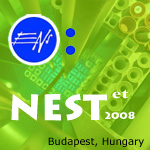

NUCNET NEWS
THE WORLD’S NUCLEAR NEWS AGENCY
Industry ‘Should Consider Financial Support’ For
UK Nuclear Students
3 Apr (NucNet): A national bursary award scheme for undergraduates
could help build a skills base for the new generation of nuclear
power plants that are expected to be built in Britain over the
next decade, the chairman of the UK Nuclear Industry Association
(NIA) said yesterday.
Lord O’Neill of Clackmannan, who is also a member of the
House of Lords Select Committee on Science and Technology, said
companies preparing to invest in nuclear new-build in the UK
might consider providing financial support to students who plan
a career in the industry.
He also stressed the importance of the country’s existing
highly-skilled nuclear workforce transferring know-how to the
next generation of nuclear professionals.
Lord O’Neill was speaking after attending a meeting of
the All Party Parliamentary Group on Nuclear at the House of
Commons. The group was updated on proposals for nuclear-related
activities by energy minister Malcolm Wicks.
“We’ve got a lot to do, but it’s clear that
government and industry together recognise the urgency with which
we need to commit ourselves in terms of expanding the nuclear
skills base the country will need,” Lord O’Neill
said. “But in many respects we are already in a position
that a number of other countries would like to be in.”
He also pointed to the launch of a bursary scheme for students
on foundation degrees, honours degrees and masters degrees recently
announced by the UK’s National Skills Academy for Nuclear
in partnership with the Nuclear Decommissioning Authority, Serco
and SBB Nuclear.
The chairman of the all-party group, Labour MP John Robertson,
said progress on developing a White Paper (policy document) on
a national high-level waste repository was also discussed.
“The waste issue is important to people and we need to
be able to explain clearly how we can safely manage legacy waste
and waste that will eventually arise from a new generation of
nuclear plants,” he said.
The government said in January 2008 that consultation about
how to deal with the country’s radioactive waste had indicated “broad
support” for geological disposal of high-level waste and
a voluntary scheme for selecting a host site.
Mr Robertson said he understood that there had already been
informal expressions of interest in the scheme by potential site
hosts.
- by John Shepherd
Source: NucNet
Editor: editors@worldnuclear.org
News in Brief / No. 48 / 21 April 2008
United Arab Emirates Establishes Nuclear Corporation 21 Apr (NucNet): The United Arab Emirates is to establish a
new corporation to oversee the possible construction and deployment
of nuclear units in the oil and natural gas-rich Gulf state.
The Emirates Nuclear Energy Corporation will serve as the nation’s
nuclear energy programme implementation organisation, foreign
minister Sheikh Abdullah Bin Zayed Al Nahyan said yesterday.
He said the UAE will also form an international advisory board
made up of experts in nuclear nonproliferation, safety, security
and infrastructure development.
Launching the UAE’s new policy on the evaluation and potential
development of peaceful nuclear energy, Mr Zayed Al Nahyan said “robust
growth” of the economy will require continued access to
affordable energy, and for this reason, the country has begun
to evaluate the potential contribution of nuclear energy to its
domestic energy mix.
He said studies carried out by the UAE have shown that nuclear
energy represents a commercially competitive and environmentally
friendly option for the secure generation of electricity, particularly
in light of projected future shortages of natural gas.
The generation of one kilowatt hour of electricity from a nuclear
reactor would cost less than one-third of what it would cost
to produce the same kilowatt hour using a crude-oil fired power
plant, he said.
He said the UAE was determined to conclude a number of pertinent
international agreements, including the IAEA Convention on Nuclear
Safety and the IAEA Joint Convention on the Safety of Spent Fuel
Management.
In an effort to limit the danger of proliferation, the government
has also adopted a policy renouncing the development of any domestic
enrichment or reprocessing capabilities in favour of long-term
arrangements for the external supply of nuclear fuel.
In January 2008, an agreement that could lead to two European
pressurised water reactors (EPRs) being built in the UAE was
announced in Paris. France’s Areva group, Suez of Belgium
and the oil and gas group Total said they had signed a partnership
agreement to submit a nuclear power plant project to the UAE
that would also involve local partners.
Source: NucNet
Editor: david.dalton@worldnuclear.org
|





